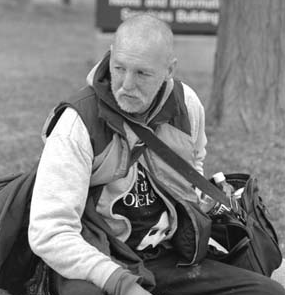The University Record, April 16, 1996
Americans have contempt for poor, Wilkins states
 ‘Papa Skins’ doesn’t call himself homeless—he just says he’s a traveler. He and others who live on Ann Arbor’s streets collect returnable bottles and redeem them for the deposit to get money for food.
‘Papa Skins’ doesn’t call himself homeless—he just says he’s a traveler. He and others who live on Ann Arbor’s streets collect returnable bottles and redeem them for the deposit to get money for food.
Photo by Rebecca A. Doyle
By Bernie DeGroat
News and Information Services
Americans have a deep-rooted, brutal contempt for poor people and only a “real” counter-cultural revolution will “break the culture of defeat and despair” that plagues our nation’s poor, scholar Roger Wilkins said last week during the finale of the ‘Evenings at the Rackham’ lecture series.
“We had a ‘pretend’ counter-cultural revolution in the ’60s, but it really wasn’t about fundamental things,” said Wilkins, a lawyer, historian, journalist and U-M alumnus. “We really have to begin to regard the poor as part of us, as people of value, people whose future we care about.”
Wilkins said that contempt for the impoverished transcends race. Middle-class and wealthy African Americans, he said, are as likely as their white counterparts to disdain poor people, regardless of color.
“It’s not just a brutal contempt for the Black poor, and it’s not just a whites-only contempt,” he said.
America’s broad-based scorn of poor people, Wilkins said, was transported from England in the 17th century after Britain was transformed from a feudalistic society to one of mercantilism in the late 1500s. This change resulted in a multitude of former serfs seeking work in cities where workers outnumbered jobs.
These poor Englishmen were labeled by their wealthier countrymen as “lazy, oversexed, violent, lacking in family values, drunken and prone to criminality,” and whose behavior could only be controlled by statutes and incarceration, Wilkins said.
In colonial America, he added, this same contempt for white, poor indentured servants continued unabated. But poor whites were bound to their wealthier white brethren through white America’s subjugation of Blacks.
“Blacks became part of the glue of the society,” Wilkins said. “Blacks at the bottom of society served two functions to bind poor whites to the rich and to serve as a floor for the egos of poor whites.”
This social ideology, he said, lasted until after the Civil War, when Americans began to develop “myths” about themselves—myths of the autonomous individual, the land of opportunity and meritocracy—that are still with us today.
Wilkins believes, however, that most poor people have had little or no chance to take part in individual autonomy or demonstrate merit.
“After slavery, America became a land of opportunity for whites and a land of negativity and depressed non-opportunity for Blacks,” he said.
While European immigrants flocked to America to find work as unskilled laborers in the late 19th and early 20th centuries, Blacks in the South were left out, Wilkins noted.
“A whole group of Americans were deliberately excluded from the opportunities afforded by the industrial revolution, while those opportunities were made available to people from Europe who didn’t even speak English,” he said.
Today, poor Blacks are “economically redundant” and are used as a “hedge” against a plummeting stock market and rising interest rates by remaining unemployed, Wilkins said.
“But they do another thing for us,” he added. “They color our contempt for the poor because they behave the way all people do when they get removed from their economic raison d’etre.”
Wilkins believes that we’ll see more of the same behavior from upper- and middle-class white Americans today as they continue to lose jobs due to corporate downsizing.
“What do they do?” he asked. “They start drinking, drugging, breaking up their families, having affairs, and some of them even kill themselves. What do people do when they become economically redundant and lose their essential meaning? They fall apart.
“Poor Black people with double-digit unemployment, and despised to boot, have been falling apart for a long time, and they act ugly, just like white people are acting ugly now.”
Wilkins said it is possible to “see through race and class, to reach down inside ourselves to places of decency and honor. We have to say that we’ll no longer accept living in a society in which our poor brothers and sisters are bludgeoned out of every decent life chance that they may have. We have to care.”

